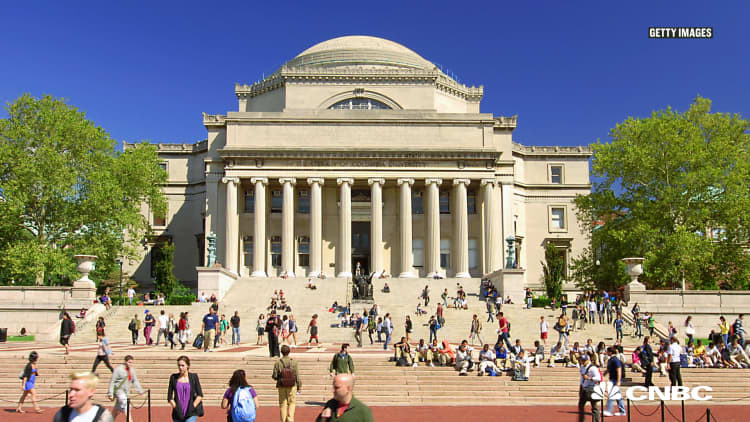Want to pursue a degree in STEM but high tuition costs are holding you back?
That's understandable. Student loan debt currently exceeds $1.5 trillion and despite a strong jobs report, many college grads are unable to find work.
Lucky for you, a number of schools now offer deferred tuition plans, particularly for those looking to join the tech field.
Unlike your typical four-year college, students at these schools can choose not to pay a penny unless they find work within a specified time frame. In most cases, the schools charge a percentage of a student's first few years of salary, but only if they earn above a certain amount.
By not charging tuition upfront, these schools believe they can lower tech's barrier for entry and attract students who don't want to incur student loan debt without a guaranteed job upon graduation.
Before you apply, talk to current and former students to understand if the program is a fit for you and your needs. Keep in mind that many of these programs require full-time commitments due to their shorter timeframes and condensed curriculums.
Many of these schools do require deposits and offer other funding options as well, including traditional monthly tuition payments and scholarships.
Make sure you read the fine print and understand the terms of any agreement you sign. Furthermore, know that non-traditional programs don't always offer accreditation like some classic four-year institutions. That said, if you plan to work for an employer that values training over a piece of paper, these six schools might be worth checking out:
1. Lambda School
What you get: Programs include a six-month computer science course that teaches major programming languages and a seven-month data science course that prepares students for a career in machine learning. All classes take place online.
When you pay: Instead of tuition, students can pay for their education once they receive a job with a $50,000 annual salary. Once students snag a job that meets the salary minimum, graduates pay back 17 percent of their salary over a period of two years (with the maximum payment capped at $30,000). If you don't find a job, or meet this income level, you don't have to pay a cent. And if you lose your job, or your monthly pay dips below $4,166.66, you can pause the repayment for that month.
2. Make School
What you get: Founded in collaboration with leading Silicon Valley employers like Facebook and Airbnb, the San Francisco-based school offers a fully accredited two-year bachelor's program in applied computer science. Students can also take specific concentrations in subjects such as: data science and machine learning, front-end and back-end web development and mobile development.
When you pay: Students who opt-in to the school's Income Share Agreement, pay zero dollars in upfront tuition. Once they receive a job that pays more than $60,000, students are charged 20 percent of their gross salary over a 60-month period.
3. Holberton School
What you get: Holberton's two-year higher education program trains students to become software and operations engineers. The curriculum is broken down into three parts: Nine months of training on the fundamentals of software engineering, an optional six-month internship and another nine months of on-site or remote study.
When you pay: Graduates pay 17 percent of their income over three years once they earn at least $40,000 a year. If within your first 42 months of work, you pay back less than the $85,000 tuition amount, Holberton will forgive the difference.
4. App Academy
What you get: Over the course of 12 weeks, students are trained on the skills needed to become software developers. Students can attend classes in either San Francisco or New York, or take a 24-week online course.
When you pay: Students who enroll in the San Francisco or New York campus can defer payment until after graduation. In return, the school can collect a share of your first-year salary once you earn $50,000 in total compensation. No additional tuition is charged if you don't find a job within one year of graduating.
5. Thinkful
What you get: The school offers a full-time online course that prepares students to become software engineers over a five-month period as well as a nights and weekends program over the course of seven months. Students have access to one-on-one mentorship from an industry expert and a personal career coach.
When you pay: You don't pay any tuition until you earn more than $40,000 a year. At that point, you must pay back 15 percent of your income for three years or $28,000, whichever comes first. If you switch jobs and your income falls below $40,000, you can pause the payment for up to a total of 24 months.
6. Grace Hopper
What you get: Students are taught software development for the web in this 17-week certificate program. The first four weeks are part-time and remote, while the remaining 13 are full-time and held on Grace Hopper's New York City or Chicago campus.
When you pay: Graduates pay the $19,910 tuition in nine monthly installments, but only after securing a job as a developer. A $3,000 deposit is required upon enrollment and is applied toward your total tuition once hired. This deposit is refunded if you don't find work within one year of graduation.
Like this story? Subscribe to CNBC Make It on YouTube!
Don't miss: Here's how you can score a tuition-free MBA



